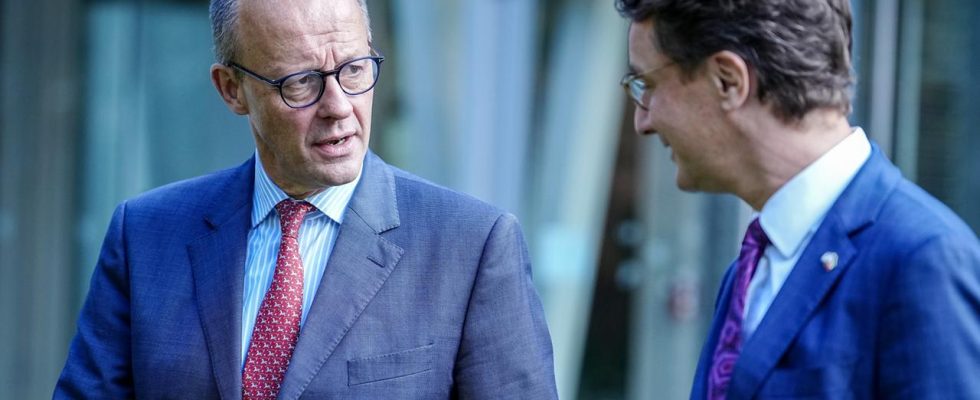analysis
The Union provides seven of the 16 prime ministers – and they were at the table at the federal-state round on migration policy. But their decisions are now being sharply criticized by the Union. How does that fit together?
After the decision of the federal-state round on migration, Union representatives sound ambiguous when asked what they think of the result. And this despite the fact that the CDU was strongly represented in the group through its Prime Ministers – and the Hessian CDU Prime Minister Boris Rhein chaired the Prime Minister’s Conference (MPK). This means that the Union man can also be held responsible for decisions and results.
It was certainly not an easy task to bring all 16 prime ministers, one from the Greens and one from the Left Party, on a common path on the issue of migration. The states agreed from the start when it came to asking for more federal support for refugee costs. The more delicate question was to negotiate which measures could be used to limit irregular migration. There is now also consensus in the federal government that this should happen. In September, Chancellor Olaf Scholz called for a cross-party alliance, the “Germany Pact”.
In fact, MPK boss Rhein also found words of praise appropriate to his role: “We have made a good step forward, we are satisfied with that.” Even if he added that the Union countries could have imagined more. Berlin’s Governing Mayor Kai Wegner expressed himself similarly positively. Hendrik Wüst, CDU state leader from North Rhine-Westphalia, was happy to have convinced the state group at the last minute that a third country regulation was included in Scholz’s catalog of demands – and thus ultimately ended up in the decision at least as an audit order.
Merz explains “Germany Pact” for done
The paper was only a few hours old when Union politicians sounded completely different – the devaluation machine was starting. Party and parliamentary group leader Friedrich Merz was downright sour and canceled Scholz’s “Germany Pact” on the subject of migration because the Chancellor had refused to set up a joint working group between the government and the Union to control immigration. CDU General Secretary Carsten Linnemann, like Merz, was skeptical on all channels. The paper is a small step, it is far from enough.
Daniel Günther, Prime Minister of Schleswig-Holstein, changed his choice of words from one day to the next in the direction of Merz/Linnemann. He said this shortly after the federal-state round NDRAfter tough negotiations, a package was agreed upon that would make it possible to “significantly limit the influx,” he said a day later Deutschlandfunk-Interview completely different: He is not satisfied, “we will only be when we see that the measures decided on have an effect.”
“Wasted opportunity” and “Little-Little”
For today, the CDU/CSU parliamentary group quickly requested a “current hour” in the Bundestag on the subject of migration – and the MPK resolution is, in the words of the Union speakers, just a “wasted opportunity” and “small-small”. It is a balancing act for the Union, which is the opposition leader in the Bundestag, but is the head of government in seven federal states and is a junior partner in two others. The politicians in the Bundestag faction do not seem to fear the effect of downplaying the work of their prime ministers with their positioning.
The question is how this will be received by the people in the country given the long lead time. Scholz had already met with Merz twice on the subject, and the countries had already discussed migration policy for a long time, most recently in October at a meeting without Scholz, then with him.
On Tuesday night, a joint decision was made in which all Union Prime Ministers were involved. In a lengthy federal-state round and a preliminary meeting between the states that was extended several times, an agreement was announced in which all sides agreed – classic democratic compromise politics.
The Union politicians reject possible concerns about downplaying this and thereby playing into the hands of the AfD and democracy skeptics. Apparently they have chosen a more confrontational line. Instead of continuing to stand behind the decisions and emphasizing the Union’s signature in them, they are calling for additional measures.
Thorsten Frei, the parliamentary managing director of the Union faction, says he can’t do anything with such a democratic policy question. Citizens would judge politics based on the facts and not whether joint decisions were subsequently praised – or not. According to the federal-state resolutions, the Union continues to find itself between constructive opposition and attack.

